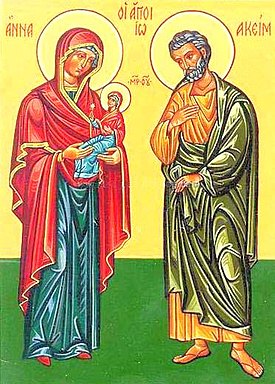Saint Joachim
| Saint Joachim | |
|---|---|

Saints Joachim and Anne, Parents of the Virgin Mary
|
|
| Father of the Blessed Virgin Mary; Confessor | |
| Born | ca. 100 B.C. Nazareth |
| Died | Unknown, Jerusalem Nazareth |
| Venerated in |
Catholic Church Orthodox Churches Anglican Communion Aglipayan Church Islam |
| Canonized | Pre-Congregation |
| Feast | July 26 (Anglican Communion), (Catholic Church); September 9 (Eastern Orthodox Church), (Greek Catholics); Calendar, 1738-1913); August 16 (General Roman Calendar, 1913-1969) |
| Attributes | Lamb, doves, with Saint Anne or Mary |
| Patronage | Adjuntas, Puerto Rico, fathers, grandparents, Fasnia (Tenerife) |
Joachim (/ˈdʒoʊ.əkɪm/; "he whom Yahweh has set up", Hebrew: יְהוֹיָקִים Yəhôyāqîm, Greek Ἰωακείμ Iōākeím) was the husband of Saint Anne and the father of Mary, the mother of Jesus, according to the Catholic, Orthodox, and Anglican traditions. The story of Joachim and Anne first appears in the apocryphal Gospel of James. Joachim and Anne are not mentioned in the Bible. His feast day is July 26.
Since the genealogies of Jesus in Matthew and Luke do not explicitly name either of Mary's parents, but apparently name two different fathers for Saint Joseph, many scholars from John of Damascus (8th century), and particularly Protestant scholars, argue that the genealogy in Luke is actually the family tree of Mary, and that Heli is her father. To resolve the problem of Joseph having two fathers - one descended from Solomon, son of David, one descended from Nathan, traditions from the 7th century specify that Heli was a first cousin of Joachim.
According to tradition, Saint Anne was born in Bethlehem, and married Joachim of Nazareth, both descendants of David. In the Protoevangelium of James, Joachim is described as a rich and pious man, who regularly gave to the poor and to the synagogue at Sepphoris. Tradition has it that the parents of the Blessed Virgin, who, apparently, first lived in Galilee, came later on to settle in Jerusalem. However, the high priest rejected Joachim and his sacrifice, as their childlessness was interpreted as a sign of divine displeasure. Joachim consequently withdrew to the desert where he fasted and did penance for forty days. Angels then appeared to both Joachim and Anne to promise them a child. Joachim later returned to Jerusalem and embraced Anne at the city gate. There was ancient belief that a child born of an elderly mother who had given up hope of having offspring was destined for great things. Parallels occur in the Old Testament in the case of Hannah, mother of Samuel.
...
Wikipedia
